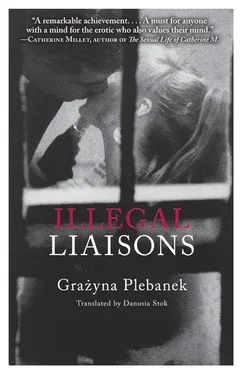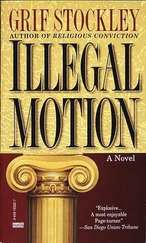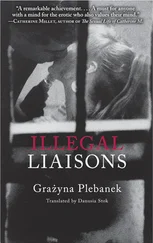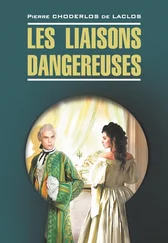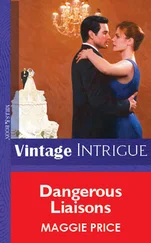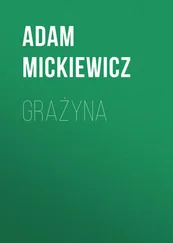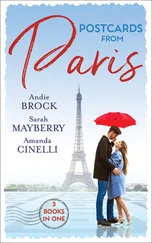Stefan pressed drinks into the hands of new arrivals, chatted, and turned lame phrases into jokes, marking his path with spontaneous outbursts of laughter. People were drawn to him, forming a buzzing crowd while he, the good host, kept appearing at the door to welcome more guests.
Jonathan had lost Megi in the crowd a long time ago and headed toward Andrea. As usual, the men had formed a circle around her, from which they emerged – capering knights – more confident, defterm and wittier than usual. Had Jonathan been himself, he would have stood at the side and watched but, when it came to Andrea, he had long ceased to be an observer, which was why he squeezed in between Przemek and Rafal and stared at his lover.
She smiled at him as she did at the others. She shared her attentions fairly with those to whom she spoke, thanks to which they blossomed like northerners under antidepressant light bulbs. Simon’s appearance disturbed the balance. In his brilliance, the brilliance of a bulb marked “authority,” the conversations grew heavier and bristled with facts. Those gathered in a circle now weighed their words, wrapped them in the cotton wool of phrases such as “I don’t know what you think but …”
When Stefan’s son, Franek, sent by Monika with a tray of canapés, stood next to them, an apparatchik with a strong French accent came to life: “Do you like the Teletubbies ?” he asked the boy.
Franek looked at him, confused. He was too old for stories aimed at two-year-olds.
“Are you also in favor of censoring the program?” A journalist from a British newspaper turned to the Poles in the circle.
Przemek made an effort to laugh.
“We’re in favor of censoring what some of those in government say.”
“You’ve got to admit, it’s an excellent publicity stunt, electing twins for the highest positions in the state,” jibed Simon.
“Isn’t one of them gay?” asked the journalist.
The smile on Franek’s face kept appearing and disappearing. He didn’t understand what was going on but tried to guess by the way the men spoke.
“Wasn’t he the one who detected homosexual undertones in kiddies’ Nightie Night ?” the bureaucrat with a French accent enquired.
“Hello, Dr Freud!” The journalist raised his hands.
Everybody laughed. Jonathan gently pushed Franek toward some other guests.
“Interesting,” he mumbled. “My friends from Poland heard about all this from the BBC. There was practically nothing about it in Poland. The statement was treated like political folklore.”
“I bet your friends don’t read Polish newspapers.”
“Why shouldn’t they? They’re Polish.”
The journalist waved it disdainfully aside.
“So, how many Polish friends have you got? Two?”
“I’m Polish.”
The journalist burst out laughing.
“You are? So where did you learn to speak English like that? Oxford?”
Jonathan held the silence a second longer than was fitting then said politely, “In Poland.”
“You mean to say,” the bureaucrat with a French accent joined in, “that nobody there has heard about the proposal to take off the kiddies’ TV show because of hidden homosexual undertones?”
“Only those who read a tiny item stuck in the middle of the most trivial news from Poland,” retorted Jonathan.
“It’s not such a small issue since the whole world is talking about it.”
“Depends what the world wants to talk about.”
“But we’re not just making it up,” said Simon.
“Of course not,” Przemek joined in placatingly.
“Facts are facts,” interrupted Jonathan. “They can be blown up or ignored.”
“Isn’t that a bit of a conspiratorial way of thinking?” Simon tipped his glass.
“Typical of those from the old Soviet bloc?” Jonathan’s voice sounded surprisingly sharp.
Przemek opened his mouth and immediately closed it; Andrea raised her hand as if wanting to speak. Simon was still looking at Jonathan with the same smile. Perhaps he was waiting for Jonathan to turn everything into a big joke, as they had both been taught to do by the English education system.
But it was too late. Something had opened in Jonathan, something that deformed his words and drew the muscles around his lips, which refused to respond to Simon’s smile. They were kinsmen, brought up in the same country; and yet Jonathan was seeing himself as others viewed him – coldly, from the outside – and what he saw was the perpetrator of a social gaffe, a serious Pole who had lost his temper.
“My son’s informed me that you’re talking about queers,” Stefan’s jovial voice resounded behind them. “At last something I know a bit about!”
Rafal quickly started chatting to the British journalist; Przemek drew the bureaucrat with a French accent aside; Andrea whispered something in Simon’s ear. Jonathan turned to Stefan and rolled his eyes, at which the latter, as if conspiring, pressed a packet of cigarettes into his hand.
The terrace was deserted, the rain having chased the smokers inside. Jonathan rested against the railings and clicked the cigarette lighter.
“Gave him a piece of your mind?” Stefan stood next to him.
Jonathan took a drag and without a word blew out a cloud of smoke.
“Don’t worry, it’s just the usual hiccup after ditching a girl. It doesn’t normally happen to me,” Stefan explained, seeing that Jonathan wanted to say something, “but I’ve seen it happen to others.”
He leaned against the railings then after a while added: “Anyway Simon had it coming. He didn’t invite you to that party. He thinks that since you’re a nobody in the Commission … You’ve shown him that’s not the case.”
“What’s not?” asked Jonathan in a drab voice.
“Well, that if you’re not in the Commission it doesn’t mean you’re not important.”
Jonathan stared at the garden stretching out in front of him.
“Stefan,” he said clearly. “I’m fucking his wife.”
“Still!” Stefan tore his hands away from the railings. “Even though she didn’t invite you to their party, ignored you, and after everything else you said?”
Jonathan stamped out the cigarette butt.
“Right, that’s not the point,” Stefan said, more to himself.
When the terrace door closed behind him, Jonathan rested his back against the rough wall. In the light seeping from the apartment, he could see the rain cutting through the air. He turned his face to the sky. How far he’d gone! He loved Andrea even for her faults. He was hurt, yet happy. Is this the essence of love, he thought. Pain?
All at once, he longed for his calm love of Megi.
“What are they talking about?” wonders Megi, looking at Jonathan on the balcony. “Exchanging rude jokes, what else?”
She turns her eyes to Andrea. She’s like a stone chafing in her shoe. Megi tries to shake it out of her mind – in vain. If it was a man who’d so irked Megi, she would confront him. But Andrea is a woman .
She remembers the dream she had that night: she was standing at a party like this one and talking about something unimportant. There were fewer people than here which was why she was surprised nobody had noticed a bear slip in through the door .
It was beautiful! Its coat, almost black, glistened like a pitch-black stream, fur swaying in rhythm with its gait. As it passed Megi, it didn’t slow down but walked between her legs at the same steady pace. She shuddered, clenched her glass tighter and, with an apologetic smile, looked around at the faces of the guests. But they seemed not to notice it, perhaps they had not even noticed the bear’s presence at the party .
She’d woken up, flooded with an irrational feeling of happiness: the bear had chosen her, passed between her legs! She burned with shame, exciting shame .
Читать дальше
